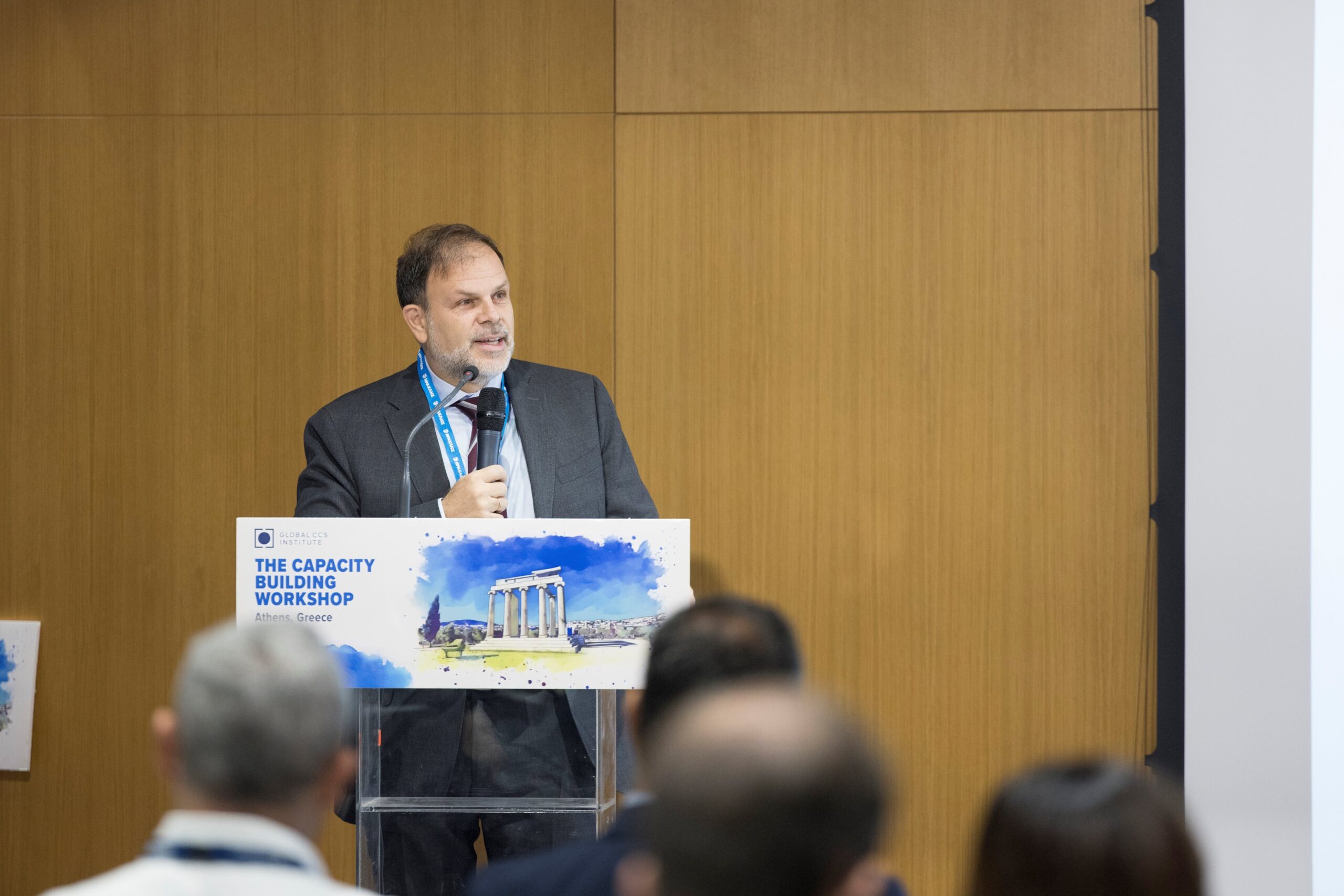H ΕΔΕΥΕΠ, το Global CCS Institute και η ολλανδική EBN συνδιοργάνωσαν Συνάντηση Εργασίας για τη Δέσμευση και Αποθήκευση CO2
Capacity Building Workshop on Carbon Capture and Storage
Αθήνα, 30 Σεπτεμβρίου 2024 Η Ελληνική Διαχειριστική Εταιρεία Υδρογονανθράκων και Ενεργειακών Πόρων (ΕΔΕΥΕΠ), η κορυφαία διεθνής δεξαμενή σκέψης Global CCS Institute και η κρατική ολλανδική εταιρεία ενέργειας Energie Beheer Nederland (EBN), συνδιοργάνωσαν την πρώτη Συνάντηση Εργασίας στην Ελλάδα για τη Δέσμευση και Αποθήκευση CO2 (CCS) που πραγματοποιήθηκε στα γραφεία του Ομίλου ΗΡΑΚΛΗΣ στις 25 και 26 Σεπτεμβρίου. Την εκδήλωση εγκαινίασε η ηγεσία του Υπουργείου Περιβάλλοντος και Ενέργειας, ο Υπουργός Θεόδωρος Σκυλακάκης, η Υφυπουργός Αλεξάνδρα Σδούκου, και ο Γενικός Γραμματέας Ενέργειας και Ορυκτών Πρώτων Υλών Αριστοτέλης Αϊβαλιώτης, οι οποίοι υπογράμμισαν τη σημασία των έργων αποθήκευσης για την ενεργειακή στρατηγική της κυβέρνησης – όπως καταδεικνύει η απόφαση να συμπεριληφθούν σχετικοί στόχοι στο Εθνικό Σχέδιο για την Ενέργεια και το Κλίμα.
Σκοπός της Συνάντησης Εργασίας ήταν η ενημέρωση σχετικά με τις ρυθμιστικές και νομοθετικές εξελίξεις σε ό,τι αφορά έργα CCS. Εστίασε ιδιαίτερα στην αδειοδότηση, δεδομένου ότι 14 συνολικά έργα αποθήκευσης CO2 ωριμάζουν και υλοποιούνται ήδη στην ΕΕ – συμπεριλαμβανομένης της χώρας μας. Σε αυτό το πλαίσιο, στη Συνάντηση συμμετείχαν εκπρόσωποι της ελληνικής κυβέρνησης και εγχώριων εταιρειών-βιομηχανιών που εμπλέκονται στην αλυσίδα του CCS (δέσμευση-μεταφορά-αποθήκευση), αλλά και ειδικοί επιστήμονες από την Ελλάδα και το εξωτερικό.
Η ΕΔΕΥΕΠ είναι η αρμόδια αδειοδοτούσα αρχή για τη γεωλογική αποθήκευση CO2 και για την εξερεύνηση και υπόγεια αποθήκευση αερίων και υγρών. Αναφερόμενος στο κομβικό έργο της εταιρείας, ο Διευθύνων Σύμβουλος Αριστοφάνης Στεφάτος σημείωσε πως η ΕΔΕΥΕΠ υποστηρίζει από την πρώτη στιγμή το ελληνικό έργο CCS στον Πρίνο και συνεργάζεται με το αρμόδιο Υπουργείο και ευρωπαϊκούς φορείς για την ανάπτυξη του απαραίτητου ρυθμιστικού πλαισίου. Τόνισε επίσης τη σημασία εξεύρεσης επιπλέον χώρων αποθήκευσης CO2 στην Ελλάδα και τη Νότια Ευρώπη γενικότερα, καθώς το CCS παίζει κρίσιμο ρόλο στην ενεργειακή μετάβαση, εξασφαλίζοντας παράλληλα την ανταγωνιστικότητα των ενεργοβόρων βιομηχανιών.
Ο Επικεφαλής Γεωεπιστημών, Ευθύμιος Ταρτάρας, ανέπτυξε την αποστολή της ΕΔΕΥΕΠ αναφορικά με το CCS, τις προκλήσεις και τα έργα που διαχειρίζεται η εταιρεία – όπως η άδεια αποθήκευσης στον Πρίνο, για την οποία η σχετική αίτηση κατατέθηκε το καλοκαίρι.
Τις τελευταίες εξελίξεις στο έργο αποθήκευσης CO2 που υλοποιείται στο σχεδόν εξαντλημένο κοίτασμα του Πρίνου στην Καβάλα παρουσίασε ο Νικόλας Ρήγας, Επικεφαλής του τομέα Αποθήκευσης Άνθρακα της EnEarth, θυγατρικής εταιρείας της Energean με αντικείμενο την απανθρακοποίηση. Στη συνέχεια, οι ελληνικές ενεργοβόρες βιομηχανίες ELPEDISON, HELLENiQ ENERGY, Όμιλος ΗΡΑΚΛΗΣ, Motor Oil και Όμιλος ΤΙΤΑΝ παρουσίασαν τα σχέδιά τους για έργα δέσμευσης άνθρακα συνολικής δυναμικότητας άνω των 4Mtpa, για την πλειοψηφία των οποίων έχουν ήδη εξασφαλίσει ευρωπαϊκούς πόρους από το EU Innovation Fund. Στη συζήτηση συμμετείχε επίσης ο Willem-Jan Plug από την ομάδα της ΕΒΝ που αναπτύσσει το έργο «Πόρθος» στις ολλανδικές ακτές της Βόρειας Θάλασσας, για να μοιραστεί την εμπειρία του σχετικά με την υποβολή αιτήσεων και το σχεδιασμό του έργου.
Στη Συνάντηση Εργασίας συμμετείχαν επίσης μέλη του Global CCS Institute, δεξαμενή σκέψης με αποστολή την επίσπευση έργων CCS στο πλαίσιο των προσπαθειών για ενεργειακή ουδετερότητα. Στις εισηγήσεις τους, οι Dr. Chris Consoli, Principal Consultant for CO2 Storage, Ellina Levina, Head of Public Affairs, Nabeela Raji, Legal and Regulatory Lead, και Bruno Gerrits, Business Development Manager (Europe), παρουσίασαν το έργο του Ινστιτούτου. Επίσης, αναφέρθηκαν στην παρούσα κατάσταση και τους δυνητικούς χώρους αποθήκευσης στην Ευρώπη, ανέπτυξαν το ζήτημα της διασυνοριακής μεταφοράς CO2, και μοιράστηκαν την εμπειρία τους αναφορικά με την αδειοδότηση έργων CCS και την υποβολή αιτήσεων για αποθήκευση.
Η δεύτερη μέρα των εργασιών περιλάμβανε τεχνικές παρουσιάσεις και συζητήσεις. Ο Βασίλης Γαγάνης, Αναπληρωτής Καθηγητής του Εθνικού Μετσόβιου Πολυτεχνείου, έδωσε το γενικό πλαίσιο της ανάπτυξης γεωλογικής αποθηκευτικής ικανότητας και τους σχετικούς περιορισμούς· ο Filip Neele του Ολλανδικού Οργανισμού για την Εφαρμοσμένη Επιστημονική Έρευνα (TNO) εμβάθυνε περισσότερο, σχετίζοντας τη γεωλογική αποθήκευση CO2 με την ολλανδική εμπειρία· ο συνάδελφός του Wiebe van Driel αναφέρθηκε στα μαθήματα που αποκόμισε η Ολλανδία από την εμπειρία αδειοδότησης έργων αποθήκευσης· και ο Stijn Santen από το EBN παρουσίασε μελέτη για την επικοινωνία με ενδιαφερόμενα μέρη σε ό,τι αφορά την ανάπτυξη και υλοποίηση έργων CCS.
Η Συνάντηση Εργασίας ολοκληρώθηκε με ένα πάνελ ενδιαφερόμενων μερών από τον ιδιωτικό και δημόσιο τομέα που συζήτησαν τι αποκόμισαν από τη συμμετοχή στην εκδήλωση και τα επόμενα βήματα που απαιτούνται για την επιτυχημένη εφαρμογή της πολλά υποσχόμενης τεχνολογίας CCS.
